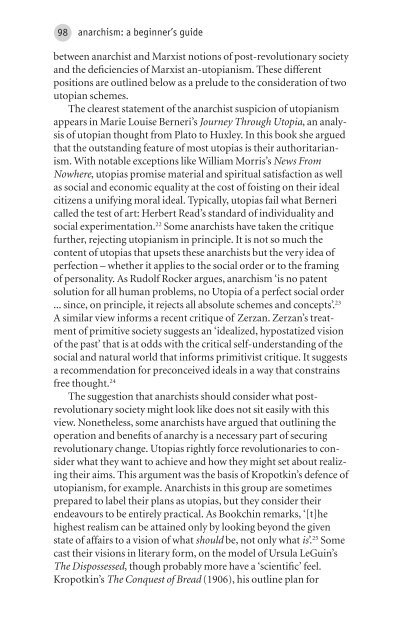o_195qg5dto17o4rbc85q1ge61i84a.pdf
Create successful ePaper yourself
Turn your PDF publications into a flip-book with our unique Google optimized e-Paper software.
98<br />
anarchism: a beginner’s guide<br />
between anarchist and Marxist notions of post-revolutionary society<br />
and the deficiencies of Marxist an-utopianism. These different<br />
positions are outlined below as a prelude to the consideration of two<br />
utopian schemes.<br />
The clearest statement of the anarchist suspicion of utopianism<br />
appears in Marie Louise Berneri’s Journey Through Utopia, an analysis<br />
of utopian thought from Plato to Huxley. In this book she argued<br />
that the outstanding feature of most utopias is their authoritarianism.<br />
With notable exceptions like William Morris’s News From<br />
Nowhere, utopias promise material and spiritual satisfaction as well<br />
as social and economic equality at the cost of foisting on their ideal<br />
citizens a unifying moral ideal. Typically, utopias fail what Berneri<br />
called the test of art: Herbert Read’s standard of individuality and<br />
social experimentation. 22 Some anarchists have taken the critique<br />
further, rejecting utopianism in principle. It is not so much the<br />
content of utopias that upsets these anarchists but the very idea of<br />
perfection – whether it applies to the social order or to the framing<br />
of personality. As Rudolf Rocker argues, anarchism ‘is no patent<br />
solution for all human problems, no Utopia of a perfect social order<br />
... since, on principle, it rejects all absolute schemes and concepts’. 23<br />
A similar view informs a recent critique of Zerzan. Zerzan’s treatment<br />
of primitive society suggests an ‘idealized, hypostatized vision<br />
of the past’ that is at odds with the critical self-understanding of the<br />
social and natural world that informs primitivist critique. It suggests<br />
a recommendation for preconceived ideals in a way that constrains<br />
free thought. 24<br />
The suggestion that anarchists should consider what postrevolutionary<br />
society might look like does not sit easily with this<br />
view. Nonetheless, some anarchists have argued that outlining the<br />
operation and benefits of anarchy is a necessary part of securing<br />
revolutionary change. Utopias rightly force revolutionaries to consider<br />
what they want to achieve and how they might set about realizing<br />
their aims. This argument was the basis of Kropotkin’s defence of<br />
utopianism, for example. Anarchists in this group are sometimes<br />
prepared to label their plans as utopias, but they consider their<br />
endeavours to be entirely practical. As Bookchin remarks, ‘[t]he<br />
highest realism can be attained only by looking beyond the given<br />
state of affairs to a vision of what should be, not only what is’. 25 Some<br />
cast their visions in literary form, on the model of Ursula LeGuin’s<br />
The Dispossessed, though probably more have a ‘scientific’ feel.<br />
Kropotkin’s The Conquest of Bread (1906), his outline plan for




